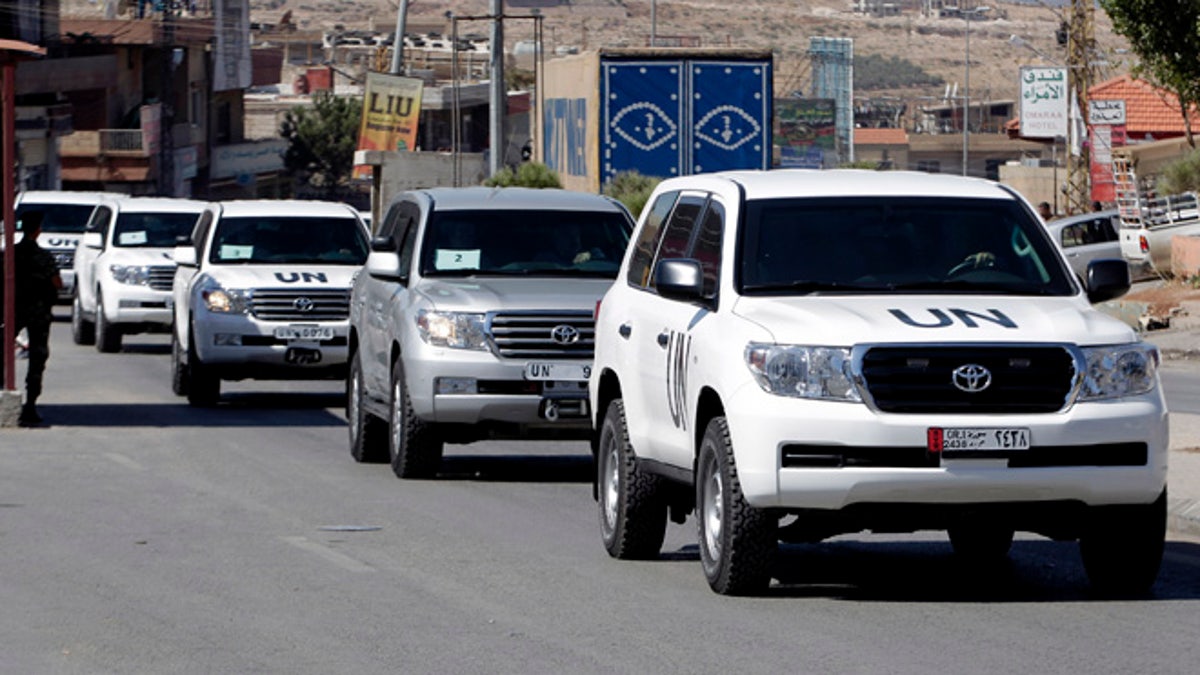
Oct. 1, 2013: A convoy of inspectors from the Organization for the Prohibition of Chemical Weapons prepares to cross into Syria at the Lebanese border crossing point of Masnaa, eastern Bekaa Valley, Lebanon. An advance group of 20 inspectors from a Netherlands-based chemical weapons watchdog arrived in Syria on Tuesday to begin their complex mission of finding, dismantling and ultimately destroying an estimated 1,000-ton chemical arsenal. (AP)
BEIRUT – International inspectors in charge of overseeing the destruction of Syria's chemical weapons left their hotel in Damascus on Wednesday to begin their work as deadly clashes raged on the edge of the capital.
The inspectors' mission — endorsed by a U.N. Security Council resolution that calls for Syria's chemical stockpile to be scrapped by mid-2014 — faces the tightest deadline ever placed before the experts from the Organization for the Prohibition of Chemical Weapons.
It was not clear where the inspectors, who arrived in Syria on Tuesday from neighboring Lebanon, were headed from their hotel in central Damascus. Their work comes against the backdrop of relentless fighting.
On the northern edge of the city, fierce clashes between Syrian troops and Al Qaeda-linked fighters killed at least 12 soldiers and pro-government militiamen on Tuesday, anti-regime activists said, as the army pressed on with a campaign to dislodge opposition fighters from the capital.
The fighting in the contested district of Barzeh had flared up on Monday, when the army stepped up attacks against opposition forces who have been trying to capture the area for months, said the Syrian Observatory for Human Rights.
Barzeh is important for rebels trying to take their battle closer to President Bashar Assad's seat of power.
At least 19 government troops have been killed in Barzeh since Monday — including the 12 on Tuesday — and dozens of others have been wounded, the Observatory said. The rebels, mostly from the ranks of Al Qaeda-linked Jabhat al-Nusra fighters, also sustained losses, but have not disclosed them, the Observatory said.
The fighting illustrates the enormous challenges the inspectors — an advance team of 19 from a Netherlands-based chemical weapons watchdog and 14 U.N. staff members — face as they kick off their work.
Within a week, a second group of inspectors is scheduled to join them to form teams that will fan out to individual locations.
They have around nine months to complete their mission, which calls for finding, dismantling and eliminating Assad's estimated 1,000-ton chemical arsenal.
Experts at The Hague, where the OPCW is based, said Sunday the inspectors' priority is to reach the first milestone of helping Syria scrap its ability to manufacture chemical weapons by a Nov. 1 deadline, using every means possible.
Some of the inspectors will be double-checking Syria's initial disclosure of what weapons and chemical precursors it has and where they are located. Others will begin planning the logistics for visits to every site where chemicals or weapons are reported to be stored.
They are empowered to conduct surprise visits to sites they suspect may contain undeclared weapons, and the U.N. resolution says they must be granted unfettered access.
The inspectors' mission was born out of a deadly chemical attack on opposition-held suburbs of Damascus on Aug. 21. The U.S. and its allies accuse the Syrian government of being responsible, while Damascus blames the rebels.
The chemical attack prompted the Obama administration to threaten punitive missile strikes against the Assad regime, touching off weeks of frantic diplomacy that culminated with a Russian-brokered proposal to have Syria surrender its chemical weapons and ended with the U.N. resolution that was adopted Friday.
The resolution also endorsed a roadmap for political transition in Syria adopted by key nations in June 2012, and called for an international peace conference in Geneva to be convened "as soon as possible" to implement it.








































